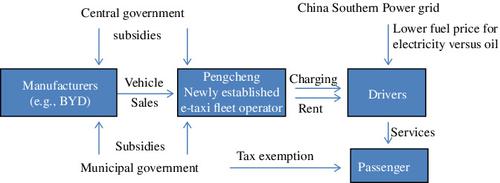当前位置:
X-MOL 学术
›
WIREs Energy Environ.
›
论文详情
Our official English website, www.x-mol.net, welcomes your feedback! (Note: you will need to create a separate account there.)
How Shenzhen, China pioneered the widespread adoption of electric vehicles in a major city: Implications for global implementation
Wiley Interdisciplinary Reviews: Energy and Environment ( IF 6.1 ) Pub Date : 2020-03-13 , DOI: 10.1002/wene.373 Mengnan Li 1, 2 , Haiyi Ye 1 , Xiawei Liao 1 , Junping Ji 1, 3 , Xiaoming Ma 1
Wiley Interdisciplinary Reviews: Energy and Environment ( IF 6.1 ) Pub Date : 2020-03-13 , DOI: 10.1002/wene.373 Mengnan Li 1, 2 , Haiyi Ye 1 , Xiawei Liao 1 , Junping Ji 1, 3 , Xiaoming Ma 1
Affiliation

|
The adoption of electric vehicles (EVs) is an important way to reduce air pollution and greenhouse gas emissions. The city of Shenzhen, in southern China, has focused on developing policies to encourage EV implementation over the past decade and now has the most EVs of any city in the world, including the largest e‐bus and e‐taxi fleets. This paper reviews Shenzhen's innovative incentive policies and business models with respect to the potential for other cities and regions to learn from the city's experiences. Subsidies for the purchase and use of EVs, the construction of charging facilities, and the provision of services followed an inverse U‐shaped trend that initially rose to encourage early adoption before decreasing as the market matured. Additional incentives included preferential vehicle licensing, parking privileges, and road access. Furthermore, the city adopted a business model that incentivized cooperation between third‐party financial institutions, EV manufacturers, and charging facility operators to reduce the initial financial burden and risk of EV adoption by pooling purchasing power through leasing and vehicle sharing while disassociating vehicle and battery maintenance. Although Shenzhen's experience has unique aspects that cannot easily be replicated, such as a strong financial position of the government, it offers two important lessons for other cities around the globe: (a) incentivize the whole EV value chain in order to avoid bottlenecks and (b) use innovative business models that mobilize both public and private resources by distributing both risks and rewards.
更新日期:2020-03-13


























 京公网安备 11010802027423号
京公网安备 11010802027423号